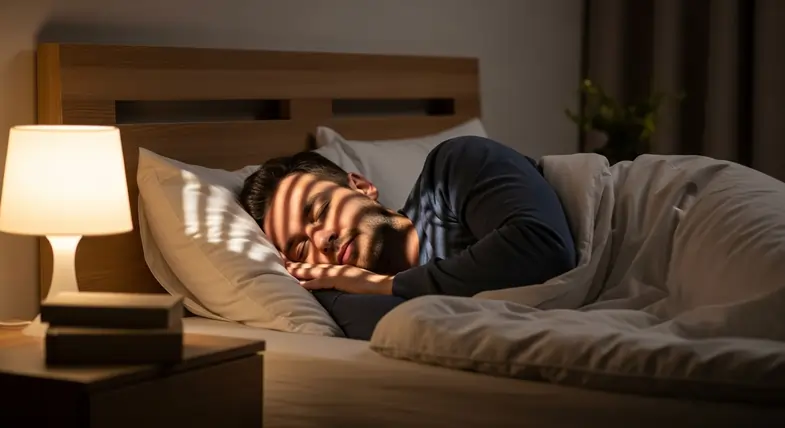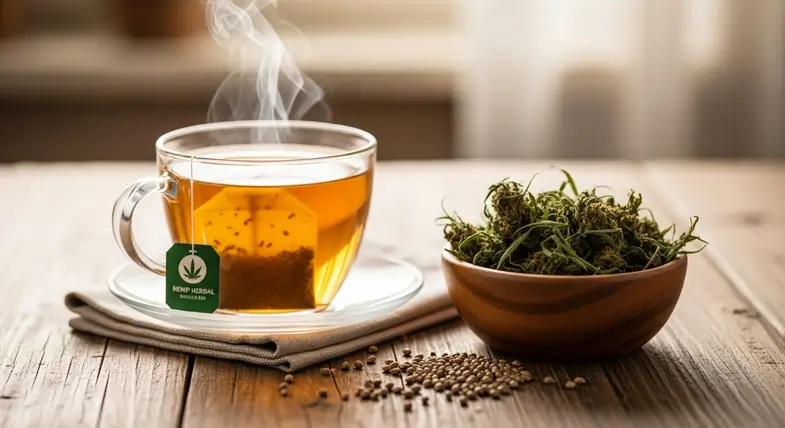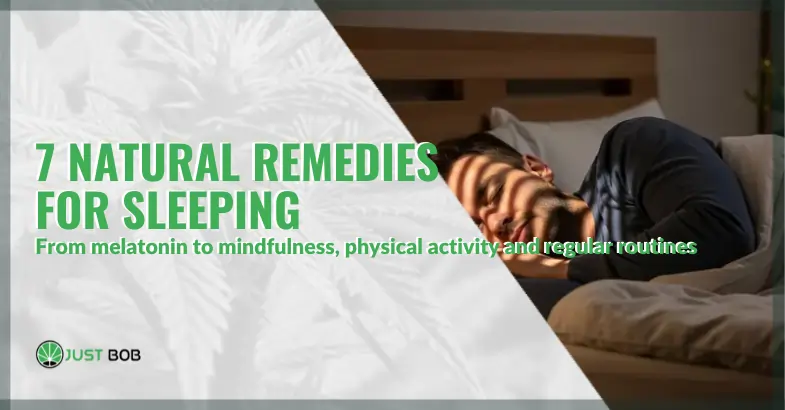Published on: 08/08/2025
From melatonin to mindfulness, physical activity and regular routines, there are natural solutions that, when integrated correctly, can help restore restful and long-lasting sleep.
Difficulty falling asleep, waking up during the night and chronic fatigue affect people of all ages, impacting their daily lives.
Sleep, essential for the body and mind, seems to elude even those who need it most. In a fast-paced society dominated by constant stimuli and pressures, the ability to indulge in deep, restorative rest is no longer a given. Insomnia and sleep disorders do not discriminate based on age or gender, creeping into the lives of young and old, men and women, compromising the quality of daily life.
In the United Kingdom, as reported by the NHL, it is estimated that about one in three people suffer from insomnia, with difficulty falling asleep, frequent awakenings during the night, or early morning awakenings. The phenomenon is particularly prevalent among older adults, but other age groups are not spared. When persistent, this problem can last for months or years, drastically reducing quality of life, affecting mood, and causing relationship difficulties in the family, at work, and in everyday life.
The lack of restorative sleep is reflected in symptoms such as constant tiredness, irritability, difficulty concentrating, and a general feeling of not being able to recover your energy. Although sleep requirements vary from person to person, most adults should sleep between 7 and 9 hours per night. What really matters is the quality of sleep and the feeling of rest upon waking.
Sleep is, in fact, a sensitive mirror of our inner state. It is deeply influenced by the experiences we have, the emotions we feel, and the tensions we accumulate. Precisely because of this reactive nature, insomnia has become a problem that is as common as it is complex. Faced with this challenge, many seek alternatives to pharmacological solutions, turning to more natural approaches and behavioral strategies to restore a healthy sleep-wake balance.
So how can insomnia be addressed without necessarily resorting to medication? Are there natural pathways and established habits that can promote quality sleep? Exploring these alternatives requires knowledge, discipline, and, above all, a responsible approach.
Read also: Effects and properties of THCB: everything you need to know
Important warning: a conscious and legal approach
Before examining any solution, it is imperative to emphasize a non-negotiable principle: health is a serious matter that requires professional guidance. Self-medication, even when based on remedies perceived as “natural,” can carry risks and will never replace the advice of a qualified physician.
Therefore, all information contained in this article is for informational purposes only and should not be construed as medical advice. It is strongly recommended that you consult your healthcare provider or a sleep specialist before taking any steps to change your habits or incorporate new products into your routine.
Furthermore, when considering plant-derived products such as Cannabis Sativa L., it is mandatory to strictly comply with the regulations in force in your country and region. The purchase and use of such products, even if marketed in compliance with the THC limits imposed by law, are subject to specific regulations that every citizen has a duty to know and comply with. Legality and safety must always be the top priorities.
Let’s now look at seven strategies and natural remedies that, as part of a holistic approach and under medical supervision, could help improve sleep quality.
1. Melatonin: synchronizing the biological clock
Melatonin is not a foreign substance in our bodies, but a hormone that is naturally produced by the pineal gland, located in the brain. Its primary function is to regulate the circadian cycle, i.e., our internal biological clock that governs sleep and wakefulness rhythms.
Melatonin production is closely linked to light: it increases in the dark, signaling to the body that it is time to prepare for sleep, and decreases with exposure to light, promoting wakefulness.
In some individuals, especially those suffering from jet lag, shift workers, or those who have difficulty falling asleep, melatonin supplementation may be helpful. The goal is to provide the body with an exogenous signal that helps resynchronize an altered sleep-wake rhythm.
However, its use requires discernment. It is not a conventional sleeping pill, but a regulator. Its effectiveness depends on the correct dosage and, above all, the timing of intake, which should be determined in consultation with a doctor.
Improper use, with excessive dosages or at the wrong times, could be counterproductive and further alter the natural cycle. Therefore, it is essential to seek the advice of a specialist before considering melatonin supplementation.
2. Regularity is key: establish a sleep routine
The human body is a creature of habit that thrives on regularity. One of the pillars of so-called “sleep hygiene” is the creation of a consistent and predictable routine. Going to bed and waking up at the same time every day, even on weekends or holidays, is one of the most effective behavioral strategies for stabilizing your circadian rhythm.
This consistency sends a powerful signal to your biological clock, which learns to anticipate periods of rest and activity. Over time, your body will become accustomed to feeling sleepy at your set bedtime and waking up more naturally in the morning, often without even needing an alarm.
This practice goes beyond simply setting a schedule. It also includes creating a pre-sleep ritual, a sequence of relaxing actions performed every evening for about 30-60 minutes before going to bed. This could include a warm bath, reading a book (not on a backlit screen), listening to calm music, or practicing light stretching exercises. The goal is to signal to your mind and body that the day is coming to an end and it’s time to slow down.


3. Actively manage anxiety and stress
Anxiety and stress are perhaps the greatest enemies of sleep. When the mind is in a state of hyper-alertness, trapped in a cycle of ruminating thoughts, worries about the future, or analysis of the past, the body responds by producing stress hormones such as cortisol. This “fight or flight” state is the physiological antithesis of the relaxation necessary to fall asleep.
Tackling insomnia means, in many cases, tackling its psychological roots. Reducing sources of stress or, more realistically, learning to manage them, is a crucial step. There are several validated techniques that can help:
- Cognitive Behavioral Therapy for Insomnia (CBT-I): a structured therapeutic approach that helps identify and modify negative thoughts and behaviors related to sleep.
- Relaxation Techniques: deep diaphragmatic breathing, progressive muscle relaxation, or guided visualization are powerful tools for calming the nervous system.
- Journaling: Writing down your thoughts and concerns in a journal before bed can help “clear” your mind, transferring anxieties from your head to paper and creating psychological distance from them.
4. The importance of physical activity
Although it may seem counterintuitive, regular exercise is a formidable ally of good sleep. Physical activity helps improve sleep quality in several ways: it increases the duration of deep sleep, the most restorative part of the sleep cycle; it can help reduce stress and anxiety; and it helps regulate the biological clock, especially if exercise is done outdoors with exposure to natural light.
However, even in this case, timing is important. Intense physical activity too close to bedtime can have the opposite effect, increasing body temperature and adrenaline levels, making it more difficult to fall asleep.
The general recommendation is to finish your workout at least 2-3 hours before going to bed to give your body time to cool down and return to a state of calm. Lighter, more relaxing activities, such as yoga or tai chi, can also be practiced in the evening.


5. The power of meditation and mindfulness
Meditation is an ancient practice that trains the mind to achieve a state of deep calm and awareness. It is not about ‘emptying the mind’, but rather observing your thoughts without judgment, letting them flow without getting overwhelmed. This practice is particularly effective in counteracting the mental rumination that often fuels insomnia.
Mindfulness is a form of meditation that involves bringing non-judgmental attention to the present moment, focusing on your breath, bodily sensations, or surrounding sounds. Practicing mindfulness can help reduce the activation of the sympathetic nervous system (the “fight or flight” response) and promote the activity of the parasympathetic nervous system, which is associated with rest and relaxation.
There are numerous resources, such as guided meditations available on many apps and online platforms, that can make this practice accessible even to beginners. Dedicating even 10-15 minutes to meditation before bed can make a significant difference in your ability to calm your mind and prepare for sleep.
6. Traditional herbal remedies: arnica and Bach flowers
In the vast world of herbal medicine and natural remedies, certain plants and preparations have a long tradition of use for general well-being. Among these, arnica and Bach flowers are often mentioned. It is essential, however, to approach them with a critical and informed perspective.
Arnica montana is a plant known primarily for its alleged anti-inflammatory and pain-relieving properties, used topically for bruises and muscle pain. There is no solid scientific evidence to support its specific and direct use for insomnia. However, it could be hypothesized that by relieving physical discomfort or muscle pain that prevents relaxation, it may indirectly contribute to more restful sleep.
Bach flowers are diluted flower essences used in a form of alternative medicine to rebalance negative emotional states. Although there is extensive anecdotal evidence of their use for anxiety and insomnia, scientific research supporting their specific effectiveness is limited and inconclusive. Some people report benefiting from them as part of a holistic approach to stress management.
For both, the principle of caution applies: their use should not replace conventional therapies and should always be discussed with a healthcare professional.
Read also: Marijuana Sugar Leaves: What they are and Why they Matter
7. The potential role of cannabidiol (CBD)
In recent years, scientific and public interest has focused on a non-psychoactive compound derived from the Cannabis Sativa L. plant: cannabidiol, or CBD.
Unlike the more well-known tetrahydrocannabinol (THC), CBD does not produce any “intoxicating” effects. Its mechanism of action is complex and mainly linked to its interaction with the body’s endocannabinoid system (ECS), an intricate network of receptors that plays a role in regulating numerous physiological functions, including mood, pain perception, and sleep.
Some preliminary studies and numerous anecdotal reports suggest that CBD may help promote relaxation and reduce anxiety, two factors closely related to sleep quality. The hypothesis is that by modulating the stress response, CBD may help create conditions conducive to falling asleep and more continuous sleep.
However, it is crucial to navigate this territory with extreme caution and awareness. Research on CBD and sleep is still in its early stages, and larger, more rigorous studies are needed to draw definitive conclusions.
The approach to CBD-containing products must be guided by two non-negotiable principles: legality and medical supervision.
- Compliance with the law: The purchase, possession, and consumption of cannabis-based products, including those with low THC content such as legal hash, for example, are regulated by specific national and local regulations that can vary significantly. It is the sole responsibility of the consumer to inform themselves and strictly comply with the laws in force in their jurisdiction. Products marketed by reputable operators, such as those found on Just Bob comply with legal THC limits, but it is important that users strictly adhere to local regulations.
- Medical Consultation: Before considering the use of any CBD-based product, it is absolutely essential to consult your doctor. Only a professional can assess your health condition, possible interactions with other medications you are taking, and determine whether such an approach is appropriate and safe for you.
An integrated approach for peaceful nights
Fighting insomnia and regaining the pleasure of deep sleep is a journey that rarely relies on a single magic solution. The most effective approach is almost always holistic and integrated, combining established behavioral strategies with the conscious and responsible use of natural remedies.
Establishing a strict sleep routine, actively managing stress, incorporating physical activity into your day, and experimenting with relaxation techniques such as meditation are the foundations of healthy sleep. In addition to these pillars, and always under the guidance of a doctor, supplements such as melatonin or other natural remedies may be used if deemed appropriate, approached with caution and in full compliance with legal regulations.
Sleep is not a luxury, but a biological necessity. Taking care of it means investing in your health, mental clarity, and overall well-being with an informed, patient, and responsible approach.
Thank you for reading, sleep well, and stay tuned: see you soon on Justbob for more articles on CBD cannabis and the world of legal hemp.
7 natural remedies for a good night’s sleep: takeaways
- The solution to insomnia often lies in an integrated approach that combines sound behavioral habits (routines, stress management, exercise) with the possible thoughtful use of natural aids.
- Before trying any remedy, supplement, or product, including melatonin and CBD, it is imperative to consult your doctor to ensure its safety and appropriateness for your health condition.
- When considering cannabis-derived products, it is mandatory to know and strictly comply with all local and national laws governing their purchase and consumption.
7 natural remedies for sleeping well: FAQ
Does melatonin really help you sleep better?
Melatonin is a natural hormone that regulates the sleep-wake cycle. In some people, especially those with irregular schedules or jet lag, it can help restore circadian balance. However, it is not a sleeping pill and should be taken in precise doses and at specific times, preferably under medical supervision.
Is it helpful to create an evening routine to improve sleep?
Yes, going to bed and waking up at the same time every day helps the body synchronize with a consistent rhythm. Having relaxing evening rituals, such as reading or taking a warm bath, also prepares the mind and body for sleep.
Can CBD promote relaxation and help with insomnia?
CBD is a non-psychoactive compound found in Cannabis Sativa L. that may help reduce stress and anxiety, promoting more restful sleep. However, scientific research is still in its early stages. It is essential to consult a doctor before taking it and to comply with the regulations in force in your country.









